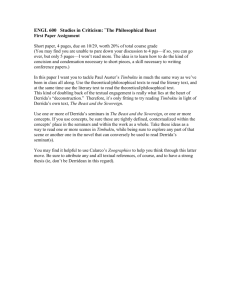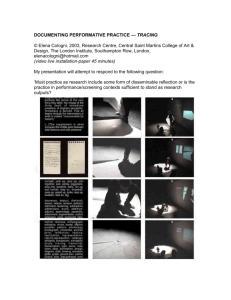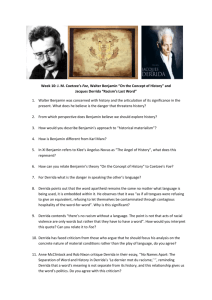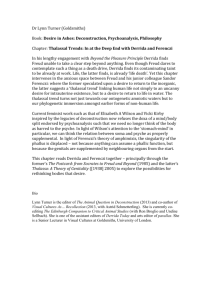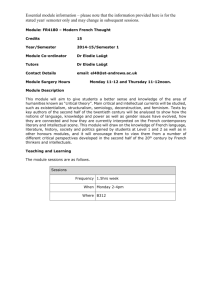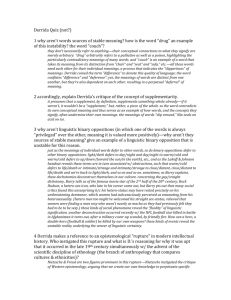Full paper (word doc) - Lancaster University
advertisement
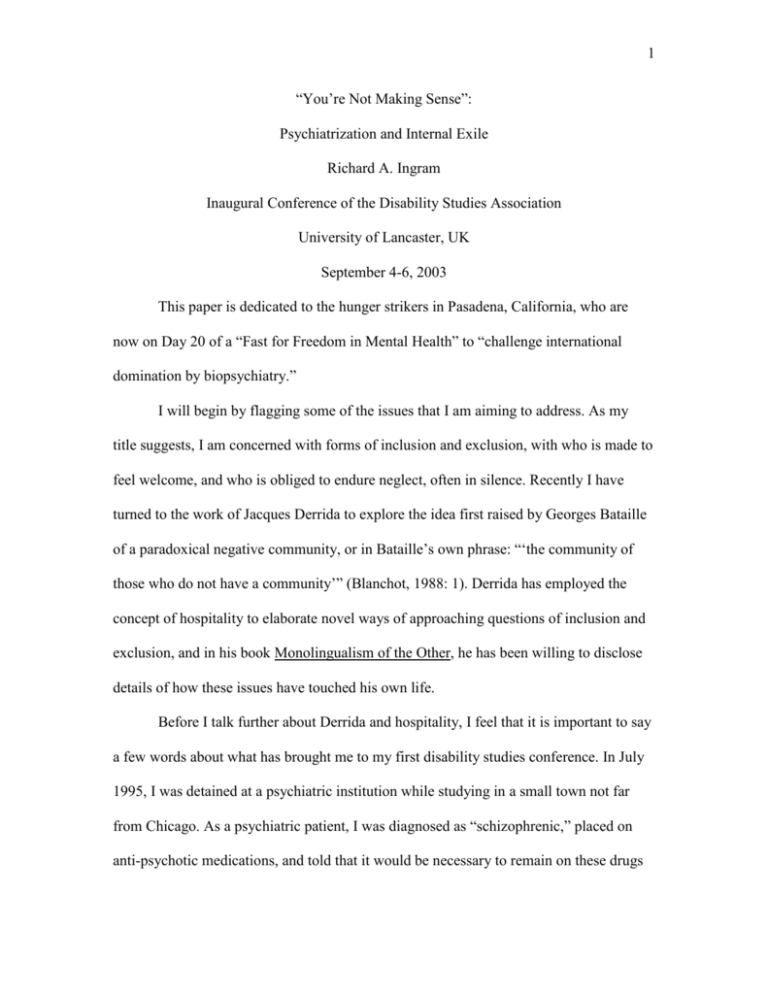
1 “You’re Not Making Sense”: Psychiatrization and Internal Exile Richard A. Ingram Inaugural Conference of the Disability Studies Association University of Lancaster, UK September 4-6, 2003 This paper is dedicated to the hunger strikers in Pasadena, California, who are now on Day 20 of a “Fast for Freedom in Mental Health” to “challenge international domination by biopsychiatry.” I will begin by flagging some of the issues that I am aiming to address. As my title suggests, I am concerned with forms of inclusion and exclusion, with who is made to feel welcome, and who is obliged to endure neglect, often in silence. Recently I have turned to the work of Jacques Derrida to explore the idea first raised by Georges Bataille of a paradoxical negative community, or in Bataille’s own phrase: “‘the community of those who do not have a community’” (Blanchot, 1988: 1). Derrida has employed the concept of hospitality to elaborate novel ways of approaching questions of inclusion and exclusion, and in his book Monolingualism of the Other, he has been willing to disclose details of how these issues have touched his own life. Before I talk further about Derrida and hospitality, I feel that it is important to say a few words about what has brought me to my first disability studies conference. In July 1995, I was detained at a psychiatric institution while studying in a small town not far from Chicago. As a psychiatric patient, I was diagnosed as “schizophrenic,” placed on anti-psychotic medications, and told that it would be necessary to remain on these drugs 2 for the rest of my life. Among the many “side effects” of this treatment was the drastic impact it had on my ability to concentrate. I deteriorated from being capable of reading dense theoretical texts in a single day to struggling through three novels over the course of a full year. It was only when a Vancouver-based psychiatrist persuaded me to come off the anti-psychotic medication in the autumn of 1996 that my powers of concentration were partially restored, causing me to realize that I had been experiencing a medicationinduced disability. A year later I chanced upon a book by Irit Shimrat, Call Me Crazy: Stories from the Mad Movement, and belatedly learned about the existence of an international movement of psychiatric survivors, or more broadly of c/s/x, consumers, survivors, and ex-patients. By reading this book, I was interpellated as a psychiatric survivor, but not yet as a person with disabilities. I will suspend my personal narrative at the moment of confronting this disjuncture, and introduce the perspective of one of the contributors to Call Me Crazy, Judy Johnny, who recalls a couple of incidents that illustrate the gap between the categories of “psychiatric survivor” and “person with disabilities.” Her testimony is also useful for an understanding of the relevance of Derrida’s writings on hospitality. Judy Johnny found that in order to be part of a psychiatric survivors group in Whitehorse, Yukon, she needed to invite herself. Or in her words: “I encouraged them to include people who have physical disabilities and have also had psychiatric treatment, and who want to be involved” (138). Johnny goes on to recount an occasion on which Irit Shimrat, the author of Call Me Crazy, declined an invitation that might have allowed Shimrat to bridge the gap between psychiatric survivors and people with disabilities: 3 Irit told me that she was once asked to speak at a conference of people with disabilities and refused on the grounds that she wasn’t disabled and didn’t want to encourage the idea that “mental illness” was a disability. I think that’s pompous. Maybe they don’t have a person in that group who’ll talk about those things. They need someone from outside to come in and say something about psychiatry. To sow that seed and then step aside, and let the people in the group take it upon themselves and go on from there. Maybe you don’t feel you belong to the disabled group. But you could try saying, “I have been labelled as having a psychiatric disability. I don’t think there’s any such thing. I was disabled by the medications; let me talk to you about that.” Then you can reach into that group. Even though you might not have a disability, there may be people who do and who want to be part of your group. So you want to be able to give an opening to someone who has a disability, who doesn’t fit into the disability community for some reason—psychiatric or whatever. And you should remember that a lot of people with other issues don’t feel they have a disability but have been labelled as having one. (141-142) Shimrat’s inclusion of Johnny’s critique in her book can, I think, be read as an attempt to make amends for having failed to accept a gesture of hospitality. And as one of the readers of this dialogue in Call Me Crazy, I hope that my presence at this conference will help to reduce what Peter Beresford [who I believe is speaking next door to us] has 4 identified as the “fears and anxieties on both sides of being linked with the negatives that are often associated with the other” (Beresford et. al., 1996: 209). Beresford’s invocation of the “negatives” associated with psychiatric survivors and people with disabilities gives me the opportunity to defer Derrida a little longer by offering one example of resentment—“ressentiment” in the Nietzschean sense—directed towards psychiatric survivors. This magazine, an alternative journal published in Toronto, focused on the psychiatric survivor movement for its first issue of 2002, entitled “Has the World Gone Mad?” “Subversive, edgy and smart,” the magazine’s website boasts, “This is the real alternative to that.” And this is the closing paragraph of Gregory Boyd Bell’s article, “No Straightjacket Required”: Medicine is about healing. [Not exactly a promising start!]. The challenge Mad Pride advances is what to do about people who insist that they aren’t sick—it’s the rest of us who have the problem. Since most people receiving psychiatric care pose little or no danger, the question really is how far the rest of society is willing to go to support people whose voices, visions or mood swings render them unproductive drains on the commonwealth. As caring people [yes, he really does use this phrase to begin the very next sentence!], we should be sympathetic to alternative treatments for those judged mentally ill. But if psychiatric survivors think we are about to shut down the psych wards and make every day an outpatient day, then they’re a few sandwiches short of a picnic. (Boyd Bell, 2002: 34) 5 Try to imagine a special issue of a radical journal devoted to feminism or anti-racism ending a feature article by questioning the sanity of women or people of colour, and you will catch a glimpse of what the psychiatrized are up against. This brings me rather neatly to Derrida’s essay, “Hostipitality,” in which Derrida observes that the Latin word from which the word “hospitality” is derived has “a troubled and troubling origin.” The irony of this Latin word is that it “carries its own contradiction incorporated into it,” because it “allows itself to be parasitized by its opposite, ‘hostility,’ the undesirable guest which it harbours as the self-contradiction in its own body” (Derrida, 2000a: 3). Clearly Boyd Bell’s vision of extending hospitality towards the psychiatrized is severely limited by the condition that we are not permitted to contest his conception of a chasm between the healthy and the sick. As soon as we challenge his premise that “medicine is about healing,” hostility gains ascendancy over hospitality, and the geographical isolation of the “sick” is enforced through the practice of involuntary confinement. By means of internment, we are handed over to the hostipitality of the patron of the mad house, memorably described by Henri-Jacques Stiker in A History of Disability as: The expert psychiatrist, absolute master of the rationalized space of the asylum where all madness ends up, the benevolent leader of the phalanxes of citizens without rights, […] one of the quintessentially important personages of society. (138) What Boyd Bell does not grasp is that having the wrong experiences at the wrong time and place can cause anyone to find themselves in a space where all rights are withdrawn, 6 a space in which tyranny is assumed to constitute an essential dimension of care and healing, one of the spaces that I have referred to in my title as that of “internal exile.” The psychiatric hospital could be viewed as the opposite of the “law of absolute hospitality” that, according to Derrida’s essay “Foreigner Question,” “commands a break with hospitality by right, with law or justice as rights” (Derrida 2000b: 25). Whereas psychiatry categorizes every manifestation of strange behaviour it witnesses, Derrida suggests that: “one of the subtle and sometimes ungraspable differences between the foreigner [or stranger] and the absolute other is that the latter cannot have a name.” In relation to this absolute other, he asserts that: “the absolute or unconditional hospitality that I would like to offer him or her presupposes a break with hospitality in the ordinary sense, with conditional hospitality, with the right to or pact of hospitality” (25). Derrida’s absolute hospitality, whose impossibility he acknowledges, would be attained by following the commands that no conditions be attached, and that no name be ascribed to the other. As an Algerian Jew, Derrida became a foreigner in his native land when the French government based in Vichy acted on its own initiative in 1940 to revoke citizenship for Jews in Algeria. In Monolingualism of the Other, Derrida reveals that he was among the many schoolchildren who were expelled from an education system that adopted the newly circumscribed definition of French citizens. For Derrida, the effect was one of being denied access to French language, literature, and culture. The point on which he insists is that this act of inhospitality, rooted at the level of language, continues to deprive him of the means to articulate what was, and what remains, lost. 7 It is because the restoration of narrative continuity is impossible that Derrida writes in the book’s epilogue that: What I am sketching here is, above all, not the beginning of some autobiographical or anamnestic outline, nor even a timid essay toward an intellectual bildungsroman. Rather than an exposition of myself, it is an account of what will have placed an obstacle in the way of this autoexposition for me. An account, therefore, of what will have exposed me to that obstacle and thrown me against it. Of a serious traffic accident about which I never cease thinking. (Derrida 1998: 70) If this were a longer presentation, I would trace similar metaphors of obstacles and traffic accidents in a memoir by Lizzie Simon that was published last year, Detour: My Bipolar Road Trip in 4-D. Given more time, I would also seek to elucidate the concept of “anamnesis” that Derrida mentions only in passing, relating it to Foucault’s hypothesis in Discipline and Punish that the emergence of documentary techniques of anamnesis marks “the birth of the sciences of man” (Foucault, 1995: 191). Instead I will merely highlight a small but decisive difference between “anamnesis” as it is defined in medicine, and the way that the same word is operationalized by psychiatrists. According to the medical understanding of this concept, anamnesis is the narration of early symptoms in the onset of illness, which is in most cases a process to which the patient contributes. The assumption made by psychiatrists, by contrast, is that few of their patients have what psychiatrists call “insight” into their own illness, a judgement that renders them 8 unreliable witnesses in the exposition of what Derrida figuratively terms “traffic accidents.” Although I do not want to detract from the gravity of the inhospitable conduct to which Derrida and other Algerian Jews have been subjected, I wish to draw attention to three aspects that may be grounds for considering the internal exile of the psychiatrized to be of even greater severity. First, our encounter with psychiatry either begins with internment, or with becoming exposed to the threat of internment. Second, we are not just stripped of access to one or more languages, literatures, and cultures, but to language, literature, and culture per se. Third, the application of these techniques of isolation is wrapped in a discourse of benevolent care, and backed up with irresistible force. Once a psychiatrist has informed you that “you’re not making sense,” you no longer have any say in determining what is in your interest, and all rights vanish into air. Derrida proposes that what happened to Algerian Jews may have been a unique event in modern history: “I do now know whether there are other examples of this in the history of modern nation-states, examples of such a deprivation of citizenship decreed for tens and tens of thousands of people at a time” (17). It is surprising that Derrida overlooks the laws of “mental health” or “mental hygiene” under which a much larger number of people around the world are detained, more often than not against their will. Or maybe it is not so surprising, for Derrida’s thinking about hospitality is oriented towards the figure of the refugee or “asylum seeker,” and therefore assumes that “asylum” is precisely that which is desired by the other. In the relationship between host and guest, Derrida looks only from the perspective of the host, and fails to notice that 9 there is no hospitality unless the other is at all times given the option of declining the offer of hospitality. I said earlier that the psychiatric hospital could be considered as the antithesis of Derrida’s impossible ideal of absolute hospitality, an impossibility of which Derrida writes: “It is necessary to do the impossible. If there is hospitality, the impossible must be done” (Derrida 2000a: 14). The hunger strikers in Pasadena include psychiatric survivors who can testify that the psychiatric hospital is also a space in which absolute hospitality is realized. Biopsychiatry is a perfect host, with the receptacle of the loony bin welcoming people who have been spat out from the mouth of the body of the social. The violence of a social order that judges many of the individuals who comprise it to be indigestible is disavowed through a projection that articulates the psychiatrized as “a danger to themselves and others.” Biopsychiatry targets the mouths of the psychiatrized, policing the words we speak, and making our re-entry to the body of the social conditional upon strict observance of a medication regimen. The Fast for Freedom draws attention to biopsychiatry’s disciplinary control of the mouth, and to the violence of the phrase “you’re not making sense” through which we are sentenced to constant surveillance as internal exiles. It is not just food that the hunger strikers are refusing to swallow; their statement is an expression of the views of psychiatric survivors around the world: we can no longer stomach a biopsychiatric order that seems incapable of recognizing that its hospitality enacts and engenders hostility towards the psychiatrized. 10 Works Cited Beresford, P., Bowden, J., and Harrison C. 1996. “What has Disability got to do with Psychiatric Survivors?” Speaking Our Minds: An Anthology of Personal Experiences of Mental Distress and its Consequences. Edited by Jill Reynolds and Jim Read. Basingstoke: Macmillan. Blanchot, Maurice. 1988. The Unavowable Community. Translated by Pierre Joris. Barrytown, NY: Station Hill. Boyd Bell, Gregory. 2002. “No Straightjacket Required.” This (35, 4), 29-34. Derrida, Jacques. 1998. Monolingualism of the Other; or, The Prosthesis of Origin. Translated by Patrick Mensah. Stanford: Stanford University Press. ---. 2000a. “Hostipitality.” Translated by Barry Stocker and Forbes Morlock. Angelaki (5, 3), 3-18. ---. 2000b. “Foreigner Question.” Of Hospitality. Anne Dufourmantelle and Jacques Derrida. Translated by Rachel Bowlby. Stanford : Stanford University Press. Foucault, Michel. 1995 Discipline and Punish: The Birth of the Prison. 2nd edition. New York: Vintage. Shimrat, Irit. 1997. Call Me Crazy: Stories from the Mad Movement. Vancouver, BC: Press Gang. Simon, Lizzie. 2002. Detour: My Bipolar Road Trip in 4-D. New York: Simon and Schuster. Stiker, Henri-Jacques. 1999. A History of Disability. Translated by William Sayers. Ann Arbor: University of Michigan Press. This magazine online, <http://www.thismagazine.ca>. Accessed on August 25, 2003.
